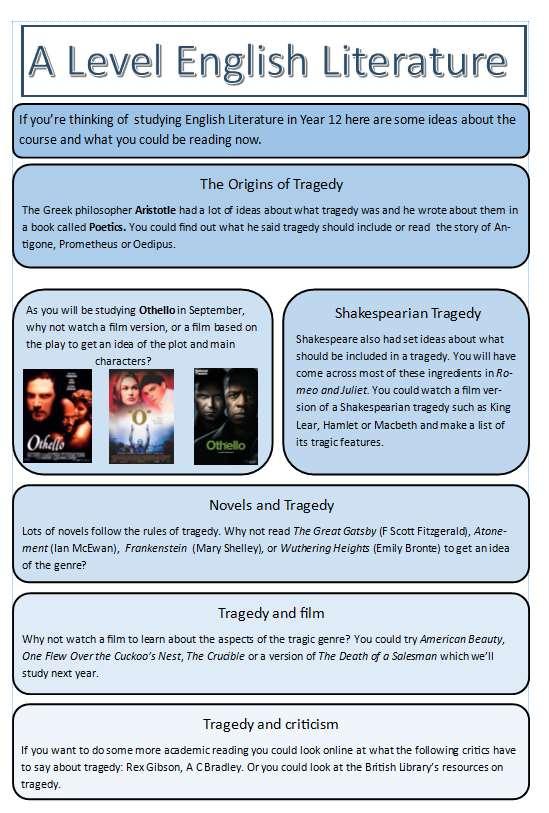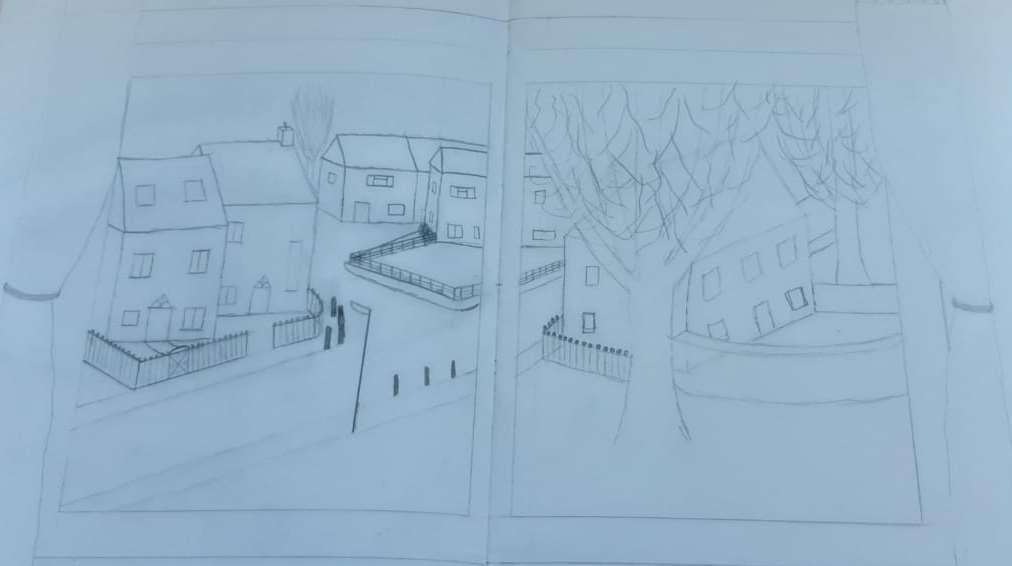
8 minute read
Year 11 work to help you into Year 12 Volume 1
Year 11 work to help you into Year 12 Mr Flett
Volume 1
Advertisement
Here are a list of ideas to get you started on work which will make a difference to your performance at A Level. Many of these are curiosity based tasks.
Of course you don’t need to just stick to the subjects you intend to study at A Level. For example, you might have enjoy music at some level – so check out the ideas there, and have a go, just out of curiosity. You might be interested in studying economics in the future – so have a look at the business ideas. You could be a geographer, but the chemistry tasks here will be interesting for you. Email the relevant staff with things you have done – they will be interested.
Hopefully at least one of your subjects will be in here, but Volume 2 will follow. We are also putting together more detailed bridging work which will help your transition to A Levels. This will take a little more time to put together.
Art
In both art and photography complete your exam sketchbooks and produce the final piece/pieces that you have been planning create in your timed exam period.
You will still be practising the skills that you need to be successful at A Level. Push yourselves to do the very best you can. We always need pieces of work to display, and so your work could inspire younger artists in the school.
Business
Part of the year 12 business course is about businesses which have taken risks (and therefore have been ‘enterprising’).
In this current global emergency, many businesses will be thinking about taking risks and new opportunities.
A curiosity project for you:
Find some examples of companies which have taken risks in the past, and changed what they do. Describe what they did. Explain why the risks paid off. Common examples might include Netflix, Apple, Tesla (but you could try to find some less obvious examples).
Research what is happening right now. During the Covid crisis, which businesses are seeing opportunities and changing their businesses. Describe what they are doing. Explain why they are doing it (eg. demand, technological possibilities, their current expertise and how it might fit with the new opportunity).
Write up your ideas and share them with us. They will really benefit the whole group in year 12 when we meet again.
Chemistry
The global impact of the Covid crisis has led to pollutant changes (in the atmosphere, but potentially also in rivers, seas and oceans). Research the Chemistry which is involved in this. Go as wide with this as you want, but in particular you could look at the following:
Find out how unburnt hydrocarbons, nitrogen oxides and sulfur dioxide get into the atmosphere. Include equations (word and balanced ones). Discuss how and where the reduction of pollutants have been most noticeable over the last few months. Include the percentage drops for pollutants. Carbon dioxide and water vapour are also pollutants from burning fossil fuels. Explain, using diagrams if you like, how these lead to global warming and how the last few months may affect the increase/decrease.
Record a list of sources that you used for your research.
History
Message from Mrs Clifford: I know some of you may be missing GCSE History lessons (!) and even if you are not I just wanted to pass on my good wishes to you all. This is not how I wanted our lessons to end so it is a real shame.
Some students wish to extend their learning and keep their minds fresh in preparation for the next stage in their education. There are plenty of tasks that you can be getting on with, whether you are planning to do History A Level or not.
In this message I will set out a number of things you could be doing to help extend your knowledge of History GCSE and keep your minds fresh. This is not just for those taking A Level – I will be sending work out separately to those planning to take A Level so watch out for that in the coming weeks. So, what can you be doing:
1. Finish the Russia and Soviet Union 1917-41 section. We didn’t quite finish this, there was one section to go which was on ‘life in Stalin’s Russia’ (the last in the pink booklet). This is a really interesting section, and I would advise you to read through this section in the booklet to make sure you have got some kind of closure on this. It tells you about the different policies Stalin introduced and why. 2. Go to the section in all users which is to be found at: all users / History / GCSE / Edexcel 9-1. In here there are sections for each of the topics (American West, Saxons and Normans, Medicine and Russia). There are also all the past questions and mark schemes. It would be good if you are carrying on in education to have a go at one of the exam papers which are saved in here, especially the Russia one which you have yet to do. Do some different questions – just set yourself some time and have a go! 3. Watch some historical documentaries – there are some good ones on youtube which cover all the topics we have covered this year. Please see attached list for some good ones but there are plenty more. 4. Watch the news and keep a diary of how events unfold over the next few months – this is living history! 5. Research a period of History that you are really interested in. You could produce a newspaper article, timeline, anything really. There are loads of good websites to help you with this – don’t just rely on Wikipedia!
1. Consider ways of composing remotely with others in your group. Amongst you you have talented instrumentalists, vocalists, percussionists and producers. Connect with one another and get the ball rolling by creating a musical response to the crisis / confinement / social distancing in the form of a musical composition. 2. Many notable musicians have composed during similar crisis points in history - notably, but not restricted to, war time. Examples include Ralph Vaughan Williams, Edward Elgar, Arnold Schoenberg, Alban Berg, Claude Debussy, Gustav Holst, Igor Stravinsky. Investigate these (and others) and how their lives were affected by the conflicts they experienced. Listen to their music. Note down your responses. Free musical scores can be accessed at imslp.org, recordings can be found on YouTube/Spotify etc. 3. Risk taking has led to some of the greatest innovations in musical history. Investigate this philosophy giving examples of musicians, composers etc. who were visionary in their approach and ‘ahead of their time’. 4. We are facing restrictions right now the like of which we have never experienced before. Black American musicians like Ella Fitzgerald, Duke Ellington, Miles Davis, James Brown and Public Enemy fought against oppression and subjugation to emerge significant figures not only in black musical history but the history of music. Investigate oppression in music and give examples of musicians, composers, etc. who were significant in bringing about change. 5. Dig out that abandoned guitar, sitar or bongo drums, dust them off and use your isolation to enhance your skills. Check out YouTube tutorials and expand your musical potential.
Psychology
In recent weeks, the media have talked about how the government is using ‘Nudge Theory’ to change the behaviour of the public in response to the Covid emergency. Here is an article on Nudge theory: https://www.bbc.co.uk/news/uk-politics-51869634
Have a read. Record bits which you think are interesting. What do you think is likely to work? Are there bits you think are less likely to work? Do you think that some personality types will be more likely to be persuaded than others?
Changing the behaviour of the majority, can be a difficult thing to do. Psychologists look at the ideas of Social Norms Intervention, Minority Influence, Conformity and Obedience.
The article above refers to ‘Social Norms Intervention’. Do some research of social norms intervention. Make a few notes of other examples of it.
There is a difference between conformity and obedience. You could find out the difference. Try to identify examples of where the government has used ‘conformity’ ideas to change behaviour, and other examples of where it has used ‘obedience’ ideas.
There has been a lot of talk in the press recently about the influence of ‘Behavioural Scientists’ on the government and how it is organising the country’s response to Covid. It is controversial. Some people have said that the government has paid too much attention to ‘Behavioural Scientists’. Do some research on this. Perhaps google search ‘Behavioural Science [Scientists] Covid response UK’ and see what comes up. There will probably be plenty of Universities talking about it.
Please share with us what you find. Email it to Miss Ould or Mr Flett. We haven’t researched this last item yet ourselves, so you’ll be doing some cutting edge stuff which we’ll be really interested in.

Sociology
One thing we study in Y12 is the nature of childhood. A key question we explore is ‘ Has childhood got better or worse in the past 50-60 years? We'd like you to talk to adults in your own house about this and also to use the phone or online means to speak to other, possibly older, adults in your family. Think about how to structure your research: You could just ask the question above and see what people say (an unstructured interview). Or you might want to structure it more by breaking it down into smaller questions. Or you could send out a questionnaire. Check if people are happy for their answers to be shared as I hope we can see what each other have found out. Please email Mr Cole with anything you find out. One thing to consider: You are asking this question at a very unusual time. How might this affect people's answers?









